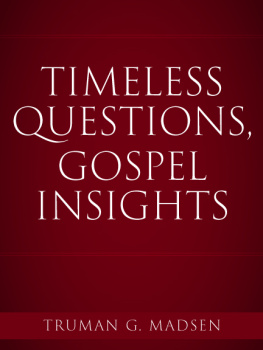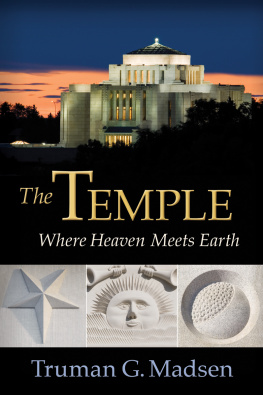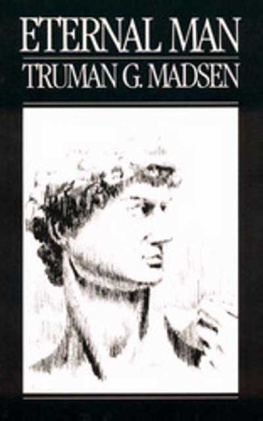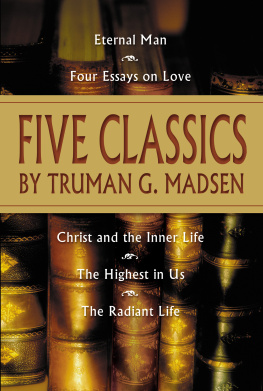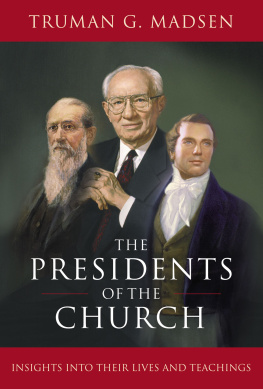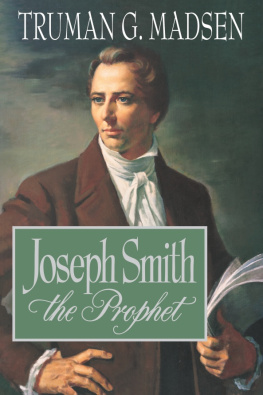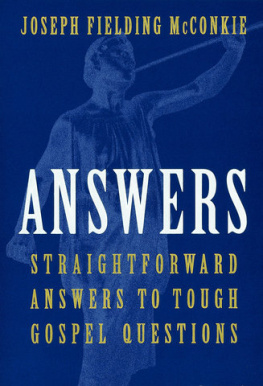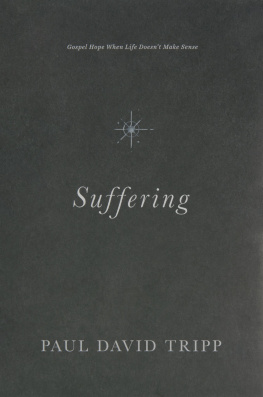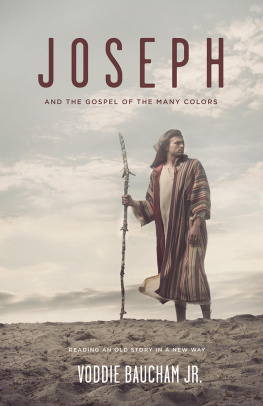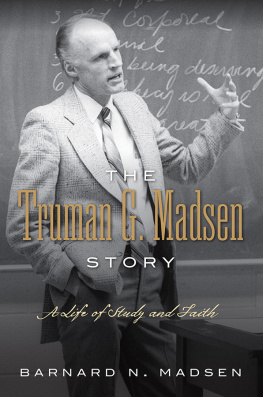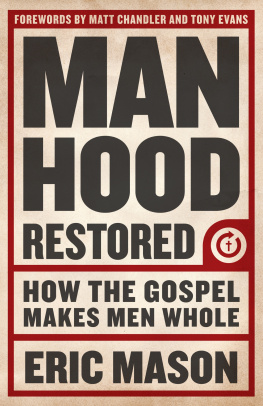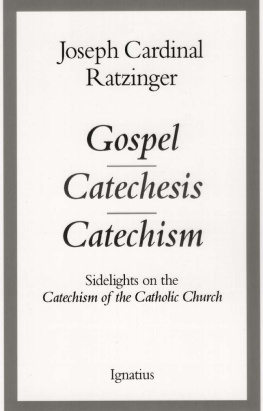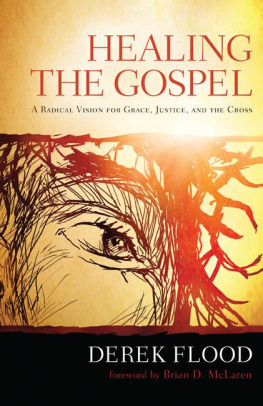Truman G. Madsen - Timeless Questions, Gospel Insights
Here you can read online Truman G. Madsen - Timeless Questions, Gospel Insights full text of the book (entire story) in english for free. Download pdf and epub, get meaning, cover and reviews about this ebook. year: 2022, publisher: Deseret Book Company, genre: Religion. Description of the work, (preface) as well as reviews are available. Best literature library LitArk.com created for fans of good reading and offers a wide selection of genres:
Romance novel
Science fiction
Adventure
Detective
Science
History
Home and family
Prose
Art
Politics
Computer
Non-fiction
Religion
Business
Children
Humor
Choose a favorite category and find really read worthwhile books. Enjoy immersion in the world of imagination, feel the emotions of the characters or learn something new for yourself, make an fascinating discovery.
- Book:Timeless Questions, Gospel Insights
- Author:
- Publisher:Deseret Book Company
- Genre:
- Year:2022
- Rating:4 / 5
- Favourites:Add to favourites
- Your mark:
- 80
- 1
- 2
- 3
- 4
- 5
Timeless Questions, Gospel Insights: summary, description and annotation
We offer to read an annotation, description, summary or preface (depends on what the author of the book "Timeless Questions, Gospel Insights" wrote himself). If you haven't found the necessary information about the book — write in the comments, we will try to find it.
Eight insightful lectures shed gospel light on age old questions such as What makes us who we are? What is mans relationship with God? What is the nature of the Universe? Am I free to choose? What is Gods role in mans suffering?
Timeless Questions, Gospel Insights — read online for free the complete book (whole text) full work
Below is the text of the book, divided by pages. System saving the place of the last page read, allows you to conveniently read the book "Timeless Questions, Gospel Insights" online for free, without having to search again every time where you left off. Put a bookmark, and you can go to the page where you finished reading at any time.
Font size:
Interval:
Bookmark:
Converting a spoken-word presentation to written prose is more an art than a science. Luckily for us, Dr. Truman G. Madsen was a well-spoken, erudite scholar. These lectures have been available as recorded audio for some time, but now they are available in written form as well. Some elements of the lectures dont come across as well in written form as they do in audio form, however. In some places, weve included sound effects or exclamations as voiced, or with bracketed explanations (such as [imitates an axe]). Because these lectures were given some time ago, and in the interest of accurately portraying the historical record, we have transcribed verbatim Dr. Madsens usage of the terms Mormon or Mormon Church rather than substituting those with the more accepted current usage of member of the Church of Jesus Christ or The Church of Jesus Christ, respectively.
The sources proved to be tricky as well. We have, to the best of our abilities, researched the direct and indirect quotations Dr. Madsen delivered in these lectures and have added citations for them here where weve found them. In some cases, we have corrected Dr. Madsens quotations to the most recent scholarship, especially as they pertain to the Joseph Smith Papers. Because this is an electronic publication and easily updated, we invite readers who find errors or know of sources weve been unable to find to send corrections to service@deseretbook.com, and well do our best to verify those and correct the electronic file.
Over the years I have been asked again and againcould you distill all of your lectures on philosophy into a few lectures? In this set of eight, I have tried. I have taken the high points of the classic questions that no one can avoid, and shed light through the Restoration on all of them. Such questions as: Why do I suffer? Who made God? What is the meaning of truth? What is ultimately realmind or matter? These questions all of us think about. If someone came to me and said you only have one day to live and you must give your final lecture, this would be my last lecture.
We have inherited some most remarkable documents which pertain to issues that have been called, in the classical tradition, cosmological and even metaphysical. Let me say up front that it is fortunate, I believe, a great blessing to this movement that we have never identified ourselves with one of the, or most of the, reigning philosophical theories. Ive said again and again that the most disastrous marriage that ever occurred to all three of the monotheistic religions, namely Judaism, Christianity, and Islam, the most disastrous marriage was the marriage of Greek philosophy and Hebrew-Christian religion. And there has never been a divorce. This is a divorce that could have been made in heaven, and in fact, we have not moved to commitment to the philosophical heritage of Plato and Aristotle. On the other hand, all the major philosophers since the Greeks have, at various points, taught, affirmed, and denied things that we teach, and affirm, and deny.
I mention on the horizon of the last century one major figure who will lead us into this discussion. His name was Alfred North Whitehead. Whitehead came to an esteemed university, namely Harvard, and taught there until his death. And he wrote a book called Adventures of Ideas and a book called Process and Reality and a book called Religion in the Making. In these works he provided a new understanding of the classical view of creation and change, and with it, of course, his understanding of God. He is sometimes called a process philosopher because he reinstated what we could call becoming as a key to the nature of the cosmos and the nature of God.
Whitehead held that the classical view that identified God with unchanging being was a mistake. Yes, there are indeed undergirding realities, or even principleshe calls them harmonization principleswhich are fixed, but process is the nature of life, and it is the ultimate nature of God.
We have statements that begin in the early 1830s from the Prophet Joseph Smith which were tremendously impactful on those who surrounded him. They were so in part because they were new to themreally newbut at the same time, they were edifying. Were blessed with many books that no one else has. We have a book of Adam, the writings we identify as the books of Moses in our Pearl of Great Price. We have a book of Abraham. We have within the book of Moses the book of Enoch. You can call the roll of the greatest prophets and patriarchs of ancient times and then say we have at least a fragment or a glimpse through writings to their thought, to what they understood.
Klaus Baer, the great Egyptologist, who for years was at the Oriental Institute in Chicago, he had written an article for one of our publications and been rather critical and agnostic about the meanings of the papyri of which we have in our facsimiles. I said to him, All right, youve done your best for the scholars, now ask the question of yourselfif I were a Mormon, what would I say about these writings? Baer said, Number one, you need to know Im a Presbyterian, I said, Yes, I know that. He said, Number two, as an Egyptologist, Im not even sure Abraham ever existed. Perhaps Abraham is a name of a conglomeration of legends that have grown up from ancient Egyptian lore. However, to answer your question, if I were a Mormon, what I would say is approximately this: You people do not believe that revelation is a puppet affair. You dont believe that somehow God does everything and man simply dangles at the end of Gods string. You believe that people have to prepare and anticipate, and seek, and concentrate. Thats your definition of revelation. I as a Mormon would say, if God wanted to prepare the mind of Joseph Smith for certain revelations about Abraham, and Abrahams revelations, then the best way to do that is to have him inherit certain manuscripts, the Chandler mummies, and their attending books, and if thats the case then that would prepare him for the revelations. If someone said to me, thats not my definition of revelation, I would reply, if I were a Mormon, dont tell God his business. Thats better than some of our critics would say about Abraham.
Its while Joseph Smith is working with these things that he starts making statements like the following, I gave some instructions in the mysteries of the Kingdom of God such as the history of the planets, Abrahams writing upon the planetary systems, etc.
Now I turn to Wilford Woodruffs own journal. He says, The Lord is blessing Joseph with power to reveal the mysteries of the kingdom of God. Notice that mysteries here applies to cosmological issues: To translate through the Urim and Thummim ancient records and hieroglyphics as old as Abraham or Adam which causes our hearts to burn within us while we behold their glorious truths opened unto us. Skipping, My soul has been much edified of late in hearing Joseph the Seer converse about the mysteries of the kingdom of God.
Now were up to 1842 and the Book of Abraham is about to be published in Times and Seasons. He says, This account speaks of Kolob, Oliblish, God sitting upon his throne, the earth, other planets, and many great and glorious things as revealed to Abraham through the power of the priesthood. The truths of the book of Abraham are truly edifying, great and glorious, which are among the rich treasures that are revealed unto us in the last days. The outside world, including some of the more learned, have treated the book of Abraham either as bogus, a kind of pseudepigrapha, or as having phrases in it which are very unfortunate. Theyre mistaken on both counts.
You can tell from Wilford Woodruff alone, something about this moved them to the very core. Lets talk for a minute about what that might be. The essential teachings that Joseph Smith transmitted to those around him included the followingweve already said that the elements are eternal; that means creation was not from nothing (Doctrine and Covenants 93:33). But he goes on to say elsewhere that chaotic matter, which is element, and in which dwells all the glory, is the stuff out of which all things are made, including mankind. Were now accustomed to talking about cloning, and it apparently is the case that every one of your cells has your particular identification tag on it, and that, theoretically, you could be reconstructed from any one of them.
Font size:
Interval:
Bookmark:
Similar books «Timeless Questions, Gospel Insights»
Look at similar books to Timeless Questions, Gospel Insights. We have selected literature similar in name and meaning in the hope of providing readers with more options to find new, interesting, not yet read works.
Discussion, reviews of the book Timeless Questions, Gospel Insights and just readers' own opinions. Leave your comments, write what you think about the work, its meaning or the main characters. Specify what exactly you liked and what you didn't like, and why you think so.

